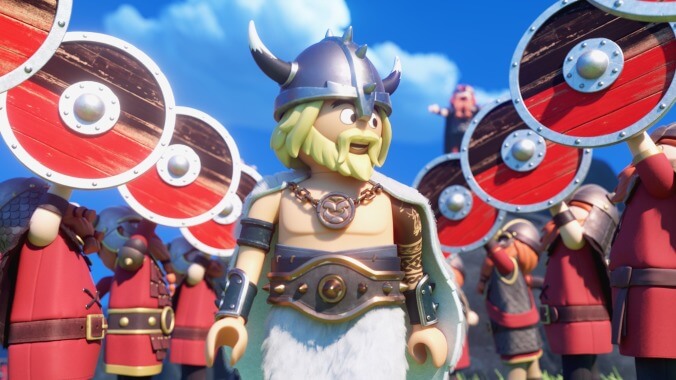Their reverie is shattered by a fatal offscreen car crash, which leaves Marla as an unlikely head of household, and—four years later—Charlie still chafing against her newly grim sense of responsibility. In a clumsily staged series of events, Charlie runs away from home, and when Marla goes after him, they both wind up magically transported into an animated world. There, they are reborn as slightly stiffer humanoids with claw-like hands and plastic hair. Marla is a rough approximation of her human self (though noticeably lacking the signature intensity of Taylor-Joy’s eyes), while Charlie is inexplicably transformed into his favorite figure, a strapping Viking with the voice and soul of a 10-year-old boy.
Through all of this, Playmobil: The Movie is blessedly free of paeans to the healing power of imagination as provided by Playmobil and its parent company, the Brandstätter Group. There aren’t even any obvious references to Playmobil lore—take it from someone with both a childhood and parental familiarity with the toy line—or to the brand’s amusingly scattershot catalog of Lego-style licensed products. (Recent properties to get the Playmobil treatment include How To Train Your Dragon, Ghostbusters, and the NHL.) Less blessedly, the movie is also free of basic kid-movie coherence. The choppiness that understandably characterizes the brief live-action section turns out to be the defining style, as the characters zip erratically from a series of mildly amusing, semi-themed chases through a cowboy world, futuristic city, and so on.
Shortly after their initial crash landing, Charlie is Viking-napped by the nefarious Emperor Maximus (Adam Lambert); Playmobil sets have often gestured slightly more toward a loopy sense of history than their Lego counterparts. For her rescue mission, Marla enlists Del (Jim Gaffigan), an itinerant food-truck driver, as well as the brief assistance of Rex Dasher (Daniel Radcliffe), one of those comically tuxedoed super-spies primarily found in kid-movie parodies of other movies few kids (and maybe not even that many contemporary parents) have ever seen. There are also songs, beginning with a charming little number for Taylor-Joy during the live-action opening. They’re not memorable tunes, but still preferable to the terrible needle drops favored by so many bigger-budget cartoons. Then again, Meghan Trainor shows up as a fairy godmother—one of a dozen characters with both the function and the personality of a deus ex machina—and warbles one of her trademark soft-consonant, faux-empowerment anthems. So this tactic has its price, too.
The toy connection is mainly an excuse for the plasticky look of the animation—and not a bad one, frankly, though the visuals are nowhere near as inventive as the fake stop-motion of those Lego pictures. For that matter, Playmobil: The Movie isn’t as funny as some of the direct-to-video Lego-related movies, either, and that’s very much the field it competes in, theatrical release or not. As children’s entertainment goes, this is a harmless distractor, but it’s also poorly conceived at every story turn, unable to even stick to a particular generic message to make up for its extremely basic humor. Is it telling kids to stay optimistic in the face of grief? To be brave and follow their dreams? Work together? Be kind to dinosaurs? Politely tolerate Meghan Trainor? Toward the end, Marla sums up the movie’s muddles and contradictions nicely, exclaiming that she and Charlie have “so many more adventures to come,” before immediately adding, “let’s go home.” Parents’ skepticism about the former will give way to relief about the latter.

 Keep scrolling for more great stories.
Keep scrolling for more great stories.
